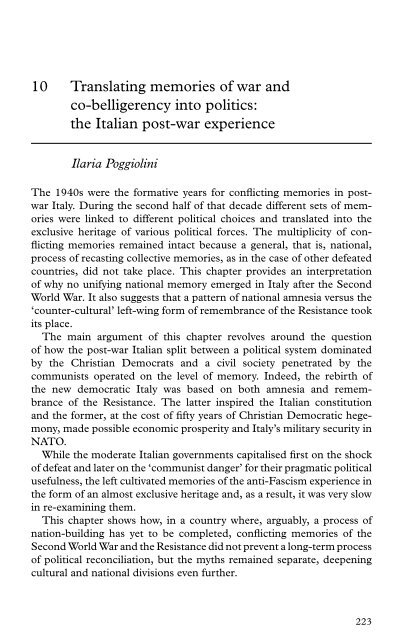Memory and Power in Post-War Europe: Studies in the Presence of ...
Memory and Power in Post-War Europe: Studies in the Presence of ...
Memory and Power in Post-War Europe: Studies in the Presence of ...
You also want an ePaper? Increase the reach of your titles
YUMPU automatically turns print PDFs into web optimized ePapers that Google loves.
10 Translat<strong>in</strong>g memories <strong>of</strong> war <strong>and</strong><br />
co-belligerency <strong>in</strong>to politics:<br />
<strong>the</strong> Italian post-war experience<br />
Ilaria Poggiol<strong>in</strong>i<br />
The 1940s were <strong>the</strong> formative years for conflict<strong>in</strong>g memories <strong>in</strong> postwar<br />
Italy. Dur<strong>in</strong>g <strong>the</strong> second half <strong>of</strong> that decade different sets <strong>of</strong> memories<br />
were l<strong>in</strong>ked to different political choices <strong>and</strong> translated <strong>in</strong>to <strong>the</strong><br />
exclusive heritage <strong>of</strong> various political forces. The multiplicity <strong>of</strong> conflict<strong>in</strong>g<br />
memories rema<strong>in</strong>ed <strong>in</strong>tact because a general, that is, national,<br />
process <strong>of</strong> recast<strong>in</strong>g collective memories, as <strong>in</strong> <strong>the</strong> case <strong>of</strong> o<strong>the</strong>r defeated<br />
countries, did not take place. This chapter provides an <strong>in</strong>terpretation<br />
<strong>of</strong> why no unify<strong>in</strong>g national memory emerged <strong>in</strong> Italy after <strong>the</strong> Second<br />
World <strong>War</strong>. It also suggests that a pattern <strong>of</strong> national amnesia versus <strong>the</strong><br />
‘counter-cultural’ left-w<strong>in</strong>g form <strong>of</strong> remembrance <strong>of</strong> <strong>the</strong> Resistance took<br />
its place.<br />
The ma<strong>in</strong> argument <strong>of</strong> this chapter revolves around <strong>the</strong> question<br />
<strong>of</strong> how <strong>the</strong> post-war Italian split between a political system dom<strong>in</strong>ated<br />
by <strong>the</strong> Christian Democrats <strong>and</strong> a civil society penetrated by <strong>the</strong><br />
communists operated on <strong>the</strong> level <strong>of</strong> memory. Indeed, <strong>the</strong> rebirth <strong>of</strong><br />
<strong>the</strong> new democratic Italy was based on both amnesia <strong>and</strong> remembrance<br />
<strong>of</strong> <strong>the</strong> Resistance. The latter <strong>in</strong>spired <strong>the</strong> Italian constitution<br />
<strong>and</strong> <strong>the</strong> former, at <strong>the</strong> cost <strong>of</strong> fifty years <strong>of</strong> Christian Democratic hegemony,<br />
made possible economic prosperity <strong>and</strong> Italy’s military security <strong>in</strong><br />
NATO.<br />
While <strong>the</strong> moderate Italian governments capitalised first on <strong>the</strong> shock<br />
<strong>of</strong> defeat <strong>and</strong> later on <strong>the</strong> ‘communist danger’ for <strong>the</strong>ir pragmatic political<br />
usefulness, <strong>the</strong> left cultivated memories <strong>of</strong> <strong>the</strong> anti-Fascism experience <strong>in</strong><br />
<strong>the</strong> form <strong>of</strong> an almost exclusive heritage <strong>and</strong>, as a result, it was very slow<br />
<strong>in</strong> re-exam<strong>in</strong><strong>in</strong>g <strong>the</strong>m.<br />
This chapter shows how, <strong>in</strong> a country where, arguably, a process <strong>of</strong><br />
nation-build<strong>in</strong>g has yet to be completed, conflict<strong>in</strong>g memories <strong>of</strong> <strong>the</strong><br />
Second World <strong>War</strong> <strong>and</strong> <strong>the</strong> Resistance did not prevent a long-term process<br />
<strong>of</strong> political reconciliation, but <strong>the</strong> myths rema<strong>in</strong>ed separate, deepen<strong>in</strong>g<br />
cultural <strong>and</strong> national divisions even fur<strong>the</strong>r.<br />
223
















